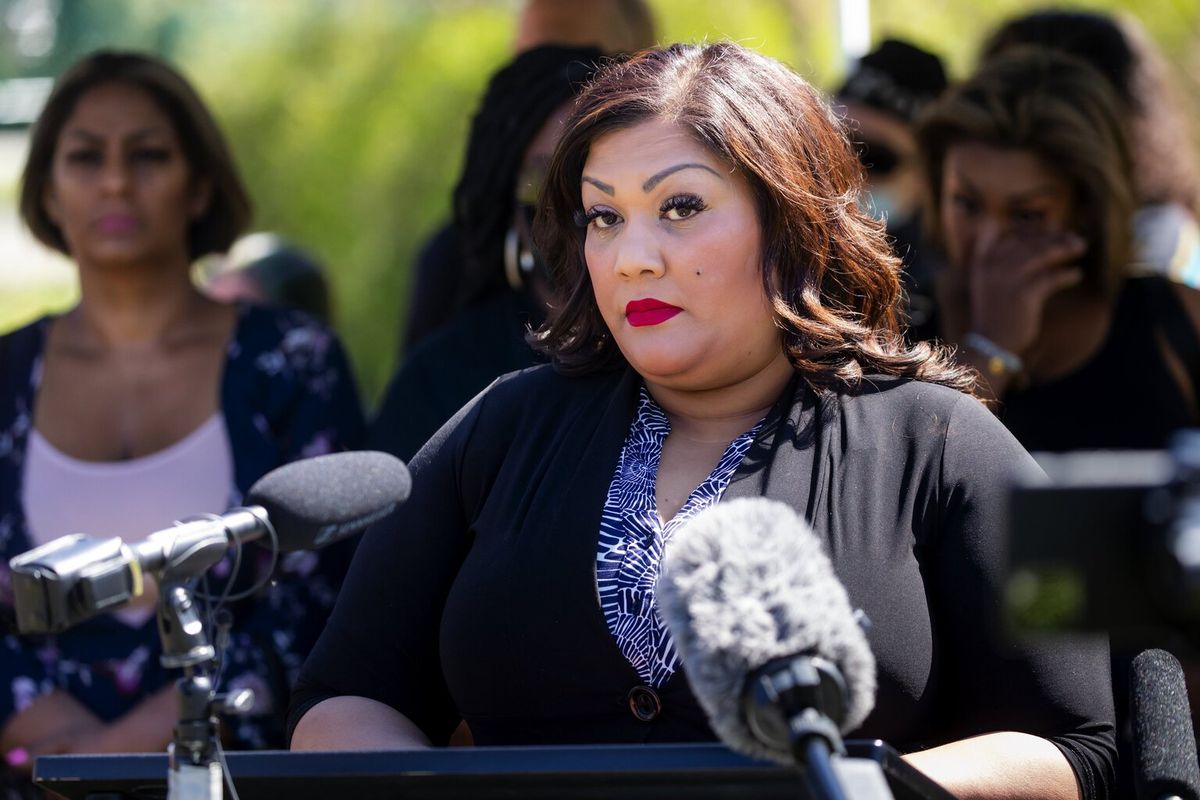$4.4 million Kent settlement brings families together to mourn their dead and protest police violence

KENT – There was no measure to the grief, anger, frustration and determination crowded under the portable blue awning erected Thursday at Canterbury Park, where the mother of Giovonn Joseph-McDade – the 20-year-old killed by police just across the street almost four years ago – stood with the families of other victims of police violence to say his name.
“It’s time for a change,” said Sonia Joseph, who had to pause to hold back tears several times as she spoke. “We need police reform now. We need to hold killer cops accountable.”
“I will never forget what happened to my son,” she said. “I am in pain every day.”
The gathering of roughly 30 people, including Joseph-McDade’s aunts, cousins and friends, was as much a call for police accountability as it was a celebration of the life of the young man family members said was a gifted student and athlete who learned to play chess when he was 6 and was “all about family.”
The family has not received an apology, and the officers involved were not charged or punished, said family lawyer Craig Sims. What they did get, however, was the next best thing in the realm of police wrongful death litigation: a substantial settlement – $4.4 million – and the city’s promise to build a memorial bench at the park, “at the very place Giovonn took his last breath.”
The family was joined by relatives of Charleena Lyles, the pregnant mother of four killed by Seattle police in her apartment six days before Joseph-McDade was killed, and of Che Taylor, whose family settled a lawsuit for $1.5 million after undercover officers killed him in 2016. A lawsuit filed by Lyles’ survivors is pending.
It was Lyles’ cousin, Tonya Isabell, who led the crowd to repeat Joseph-McDade’s name.
Sonia Joseph has joined these families as a member of the Washington Coalition for Police Accountability, and has successfully led efforts to reform the King County coroner’s inquest system after her family was denied representation at the coroner’s inquest held on the death of her son, said one of her lawyers, Pat Bosman. Those reforms are in legal limbo, however, after several South King County cities – including Kent – challenged them in court.
The coalition has championed several police-practice reform and accountability measures that have passed the Legislature this session – including a ban on “hot pursuits” and firing into a moving vehicle – and are on their way to Gov. Jay Inslee for his signature, said Leslie Cushman, the coalition’s founder and citizen sponsor of Initiative 940, which removed hurdles to charging police officers with homicide and transformed how police shootings are investigated.
Cushman praised the dedication of Joseph and the others for their determination to humanize the need for police reform.
“My journey through this horrifying, ugly process led me to work on police reform,” Joseph said.
Joseph praised the governor for his leadership but had little good to say about officials in Kent or King County – particularly the office of King County Prosecutor Dan Satterberg – which ran the inquest process and which has declined to file criminal charges against the officers involved in her son’s death.
Joseph and others were incensed at the city’s public response to the settlement, attributed to city spokesperson Bailey Stober, which defended the Kent officer’s actions as legal and within department policy and insisted the city was ready to take the case to trial even as he announced the mediated $4.4 million settlement – one of the largest police wrongful-death settlements in Washington in recent years.
Kent Officer Matthew Rausch had initially stopped Joseph-McDade early on June 24, 2017, in the parking lot of a Kent convenience store for having an expired registration. In court documents, the officer said he had focused on the car, containing three young Black men, because, he said, one of the young men “appeared startled” when he saw the officer and exited the car.
Discovering the car had an expired registration, Rausch called for backup and gave pursuit. Another officer, William Davis, responded, according to police reports.
Joseph-McDade, with a single passenger, drove away from Rausch, who testified that he “punched [the gas]” as he drove off. However, evidence cited in court motions show a computer-assisted dispatch report from the officer’s car indicates Joseph-McDade drove between 20 and 30 mph, under the posted speed limit of 35.
The judge noted in an order denying Kent’s efforts to dismiss the lawsuit that Joseph-McDade used his turn signals and turn lanes during the brief pursuit.
Joseph-McDade, who was unarmed, drove into a cul-de-sac at about 10 mph, with the two police cars right behind him, according to court files. When he stopped, Davis exited his car, drew his handgun and ordered the two young men out of the vehicle.
Davis fired two rounds into the car after, he later said, he heard Joseph-McDade’s engine “rev up” and the car “launch directly” at him. Rausch, meantime, rammed his police cruiser again into Joseph-McDade’s car.
At the coroner’s inquest, Davis said it seemed the car “was barreling toward me. It was coming at me at a high rate of speed … it seemed like the car was going 100 miles an hour.” However, a plaintiff’s accident reconstruction expert concluded Joseph-McDade’s car was traveling no faster than 9 mph when the shots were fired.